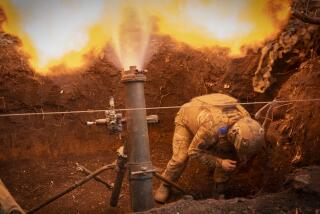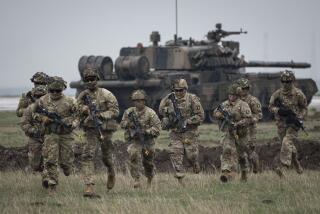Report May Shape NATO Stand on Tactical A-Arms : Military: Ministers discuss defense officials’ findings--that it would be safe to curb short-range nuclear weapons.
- Share via
KANANASKIS, Canada — In the wake of an agreement limiting non-nuclear forces in Europe, an attacking army of Soviet troops would have so far to march and would arrive so thinned-out that the North Atlantic Treaty Organization can safely dispense with most of its short-range nuclear weapons, senior NATO defense officials have concluded.
The preliminary findings were presented to NATO defense ministers here Wednesday in the draft of a study prepared by the alliance’s “High-Level Group”--officials from 15 allied nations responsible for nuclear policy. Its findings were among the first matters discussed as the ministers opened two days of meetings here on the future of nuclear weapons in Europe.
The report is expected to shape NATO’s position on pursuing negotiations with the Soviets to reduce or eliminate each side’s force of short-range, ground-launched nuclear weapons. President Bush called for the acceleration of such negotiations last Friday.
In their first day of meetings, however, allies here clashed about the aim of those talks. West German Defense Minister Gerhard Stoltenberg said he found “wide support for the German position that the clear aim of these negotiations should be the removal of all land-based systems of the United States and the Soviet Union.”
But a senior British official said his government opposes the proposal that elimination rather than the reduction of those missiles should be NATO’s goal. American officials in Washington have said the Administration is willing to accept a ban on the missiles in Europe. At the NATO meeting, however, U.S. defense officials argued against publicly defining any stance as an opening position in the negotiations.
Stoltenberg said Wednesday that those negotiations could begin as soon as December.
The West German defense minister joined his Dutch counterpart, Relus ter Beek, in urging the alliance unilaterally to withdraw nuclear artillery shells from Europe and to ask the Soviet Union to do the same.
There was a “general feeling” within the alliance that the nuclear shells, most of which are deployed in West Germany, can be eliminated, Dutch Ambassador to NATO Adrian Jacobovits said.
With agreement now being finalized to cut conventional forces in Europe, the report presented to defense ministers explores the implications for NATO’s nuclear needs. An American official said the study, commissioned six months ago, strongly suggests that even after negotiated reductions, some ground-based nuclear missiles should remain in Europe.
The alliance defense chiefs are expected to conclude the two-day meeting today.
More to Read
Sign up for Essential California
The most important California stories and recommendations in your inbox every morning.
You may occasionally receive promotional content from the Los Angeles Times.














